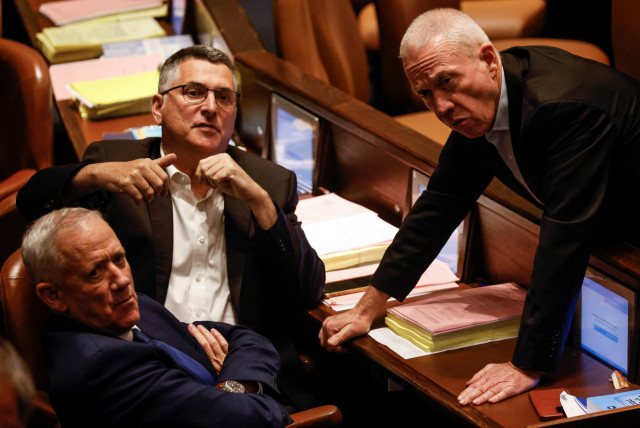Sa'ar holds first party meeting after break off from Gantz

According to Sa'ar, the decision-making process made in the small war cabinet is problematic, and the MK has demanded to become a member of the smaller cabinet.
The decrease in the IDF’s pace and pressure in its operations is lengthening the conflict in the North and negatively affecting Israel’s international standing, Minister Gideon Sa’ar said Monday.
According to Sa’ar, the fact that the main decisions about the war are being made in the small war cabinet instead of the statutory national security cabinet is problematic, and he repeated his demand to become a part of the smaller cabinet as well.
Sa’ar, the New Hope – The United Right chairman and minister-without-portfolio made the comments during a press conference ahead of his party’s first official meeting after splitting from National Unity last week.
Sa’ar claimed that when National Unity first joined the government, he was supposed to have been appointed to the cabinet, but he agreed that National Unity Minister-without-Portfolio Gadi Eisenkot, a former IDF chief of staff, take his spot.
“But we should have already been in a different place,” Sa’ar said. “We need to act at a faster pace, with more forces. We need to increase the military pressure on Hamas,” Sa’ar said.
He also argued that the destruction of Hamas’s ruling capabilities was not proceeding as planned.“Hamas’s takeover of humanitarian aid meant for civilians strengthens it, and undermines the goal,” Sa’ar said.
Threats to quit government
Sa’ar also repeated a statement from earlier this week, that if he is not given a seat in the war cabinet, his party will quit the government. Even if it does, it will not call for an election, according to a clarification by Sa’ar’s spokesperson.
A number of other party leaders held their own press conferences on Monday ahead of their parties’ weekly meetings.
Opposition leader and Yesh Atid chairman MK Yair Lapid criticized what he claimed was the coalition’s “disgraceful” attempt to wiggle its way out of a decision to draft haredi (ultra-Orthodox) men into the IDF to fill ranks of casualties and meet Israel’s heightened security needs.
“The fact that they again are making up tricks and finagles and delays is not just an affront to our soldiers, it endangers the State of Israel,” Lapid said. The Supreme Court on Sunday gave the government a small extension to March 27 to deliver its response as to why it was not drafting haredi men after the law that enabled the exemption expired last June.
“If they care about security, they need to tell the haredi parties: ‘Friends, there are no more games. You need to internalize that you are done getting without giving. Whoever does not enlist will not receive even one worn-out agora [a 100th of a shekel],’” Lapid added.
Yisrael Beytenu head Avigdor Liberman said it was no longer possible to talk about quotas for haredi men to enlist in the IDF every year, and that it was time for a law that every 18-year-old will serve for three years, after which “they will do whatever they want,” Liberman said.
Talks between haredi parties, Prime Minister Benjamin Netanyahu, Defense Minister Yoav Gallant, and Finance Minister Bezalel Smotrich have been ongoing over the past few weeks to find a way to solve the current haredi draft crisis.The crisis began after the government last month announced its plan to extend mandatory and reserve duties for current soldiers, but without recruiting soldiers from a broader pool of candidates, such as haredim, to lessen the burden on those who already are serving.
The crisis also coincided with a court case against the haredi exemption that is currently underway in the Supreme Court. The previous law that enabled haredi exemption officially expired at the end of June 2023, and the government decided that it would pass a new law by the end of March 2024.
However, with that date nearing, the government does not seem close to solving the issue, and it is likely to request other extensions until the end of June. Government funding for yeshiva students also stems from the law that expired, and thus if no solution is found on time, haredi men may no longer be legally entitled to an exemption, and yeshivot may lose their funding.
Israel Hayom reported on Monday evening that one of the possible solutions was to raise the age of exemption for haredi men from its current 26 to somewhere between 35 and 40. This means that haredi men who leave their yeshiva before that age would need to serve in the IDF.
The idea is that this will allow whoever wants to study full time to continue doing so, but on the other hand, it will disincentivize haredim who are not interested in studying from using their yeshiva student status as a cover to avoid IDF service. Haredi men who are yeshiva students cannot legally work.
Some ministers, such as Smotrich, thought prior to October 7 that the age of exemption should be lowered to as low as 21 to enable haredi men to join the workforce earlier without having to do IDF service first. The new idea to do the opposite and actually increase the age of exemption would be a significant conceptual shift.
Jerusalem Post Store
`; document.getElementById("linkPremium").innerHTML = cont; var divWithLink = document.getElementById("premium-link"); if (divWithLink !== null && divWithLink !== 'undefined') { divWithLink.style.border = "solid 1px #cb0f3e"; divWithLink.style.textAlign = "center"; divWithLink.style.marginBottom = "15px"; divWithLink.style.marginTop = "15px"; divWithLink.style.width = "100%"; divWithLink.style.backgroundColor = "#122952"; divWithLink.style.color = "#ffffff"; divWithLink.style.lineHeight = "1.5"; } } (function (v, i) { });

